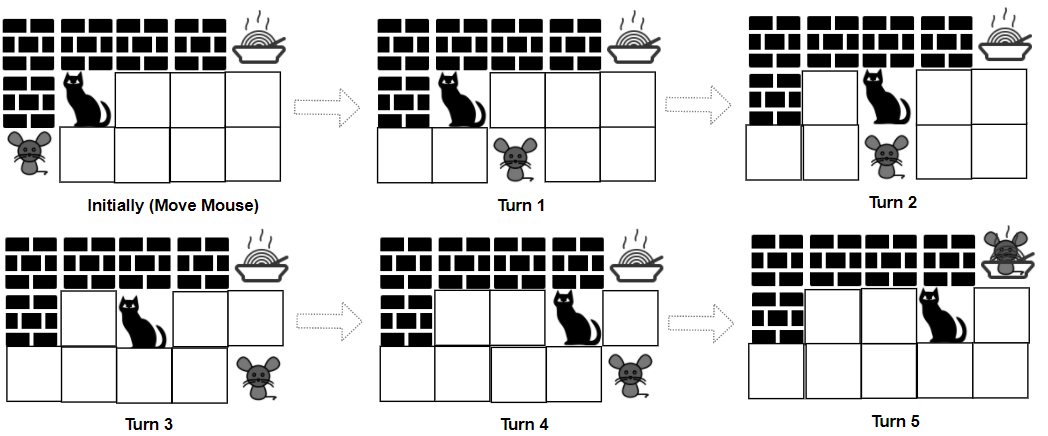LeetCode in Kotlin
1728. Cat and Mouse II
Hard
A game is played by a cat and a mouse named Cat and Mouse.
The environment is represented by a grid of size rows x cols, where each element is a wall, floor, player (Cat, Mouse), or food.
- Players are represented by the characters
'C'(Cat),'M'(Mouse). - Floors are represented by the character
'.'and can be walked on. - Walls are represented by the character
'#'and cannot be walked on. - Food is represented by the character
'F'and can be walked on. - There is only one of each character
'C','M', and'F'ingrid.
Mouse and Cat play according to the following rules:
- Mouse moves first, then they take turns to move.
- During each turn, Cat and Mouse can jump in one of the four directions (left, right, up, down). They cannot jump over the wall nor outside of the
grid. catJump, mouseJumpare the maximum lengths Cat and Mouse can jump at a time, respectively. Cat and Mouse can jump less than the maximum length.- Staying in the same position is allowed.
- Mouse can jump over Cat.
The game can end in 4 ways:
- If Cat occupies the same position as Mouse, Cat wins.
- If Cat reaches the food first, Cat wins.
- If Mouse reaches the food first, Mouse wins.
- If Mouse cannot get to the food within 1000 turns, Cat wins.
Given a rows x cols matrix grid and two integers catJump and mouseJump, return true if Mouse can win the game if both Cat and Mouse play optimally, otherwise return false.
Example 1:

Input: grid = [”####F”,”#C…”,”M….”], catJump = 1, mouseJump = 2
Output: true
Explanation: Cat cannot catch Mouse on its turn nor can it get the food before Mouse.
Example 2:

Input: grid = [“M.C…F”], catJump = 1, mouseJump = 4
Output: true
Example 3:
Input: grid = [“M.C…F”], catJump = 1, mouseJump = 3
Output: false
Constraints:
rows == grid.lengthcols = grid[i].length1 <= rows, cols <= 8grid[i][j]consist only of characters'C','M','F','.', and'#'.- There is only one of each character
'C','M', and'F'ingrid. 1 <= catJump, mouseJump <= 8
Solution
@Suppress("NAME_SHADOWING")
class Solution {
private val graphs: Array<Array<List<Int>>> = arrayOf(arrayOf(), arrayOf())
private var foodPos = 0
private lateinit var memo: Array<Array<IntArray>>
fun canMouseWin(grid: Array<String>, catJump: Int, mouseJump: Int): Boolean {
val m = grid.size
val n = grid[0].length
var mousePos = 0
var catPos = 0
for (i in 0 until m) {
for (j in 0 until n) {
val c = grid[i][j]
if (c == 'F') {
foodPos = i * n + j
} else if (c == 'C') {
catPos = i * n + j
} else if (c == 'M') {
mousePos = i * n + j
}
}
}
graphs[0] = buildGraph(mouseJump, grid)
graphs[1] = buildGraph(catJump, grid)
memo = Array(m * n) { Array(m * n) { IntArray(2) } }
for (i in 0 until m) {
for (j in 0 until n) {
val c = grid[i][j]
if (c == '#' || c == 'F') {
continue
}
val catTurn = 1
dfs(i * n + j, foodPos, catTurn)
}
}
return memo[mousePos][catPos][MOUSE_TURN] < 0
}
private fun buildGraph(jump: Int, grid: Array<String>): Array<List<Int>> {
val dirs = arrayOf(intArrayOf(-1, 0), intArrayOf(1, 0), intArrayOf(0, 1), intArrayOf(0, -1))
val m = grid.size
val n = grid[0].length
val graph: Array<List<Int>> = Array(m * n) { mutableListOf() }
for (i in 0 until m) {
for (j in 0 until n) {
val list: MutableList<Int> = ArrayList()
graph[i * n + j] = list
if (grid[i][j] == '#') {
continue
}
list.add(i * n + j)
for (dir in dirs) {
for (step in 1..jump) {
val x = i + dir[0] * step
val y = j + dir[1] * step
if (x < 0 || x >= m || y < 0 || y >= n || grid[x][y] == '#') {
break
}
list.add(x * n + y)
}
}
}
}
return graph
}
private fun dfs(p1: Int, p2: Int, turn: Int) {
var turn = turn
if (p1 == p2) {
return
}
if ((if (turn == 0) p2 else p1) == foodPos) {
return
}
if (memo[p1][p2][turn] < 0) {
return
}
memo[p1][p2][turn] = -1
turn = turn xor 1
for (w in graphs[turn][p2]) {
if (turn == MOUSE_TURN || ++memo[w][p1][turn] == graphs[turn][w].size) {
dfs(w, p1, turn)
}
}
}
companion object {
private const val MOUSE_TURN = 0
}
}

